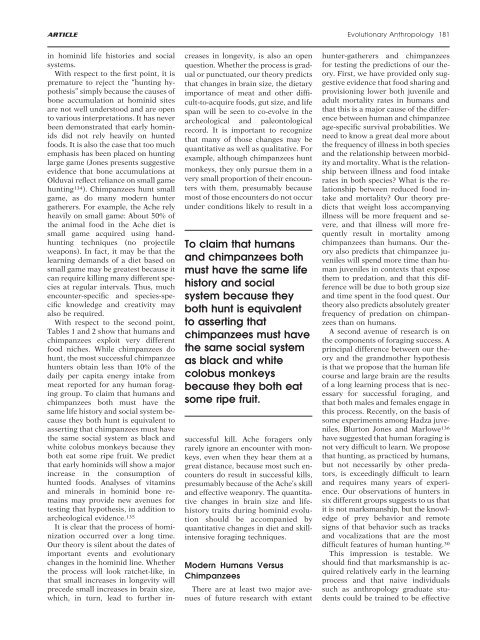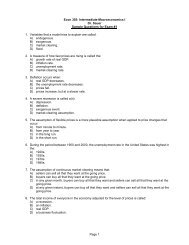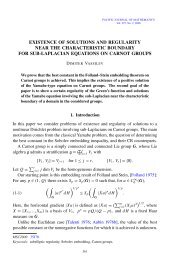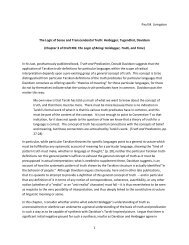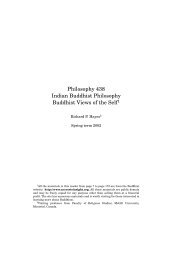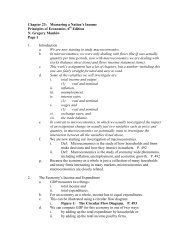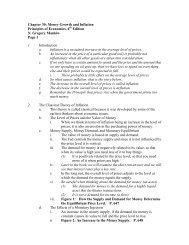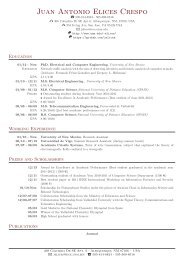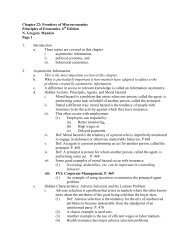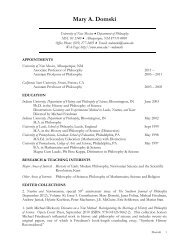A Theory of Human Life History Evolution - Radical Anthropology ...
A Theory of Human Life History Evolution - Radical Anthropology ...
A Theory of Human Life History Evolution - Radical Anthropology ...
You also want an ePaper? Increase the reach of your titles
YUMPU automatically turns print PDFs into web optimized ePapers that Google loves.
ARTICLE <strong>Evolution</strong>ary <strong>Anthropology</strong> 181<br />
in hominid life histories and social<br />
systems.<br />
With respect to the first point, it is<br />
premature to reject the “hunting hypothesis”<br />
simply because the causes <strong>of</strong><br />
bone accumulation at hominid sites<br />
are not well understood and are open<br />
to various interpretations. It has never<br />
been demonstrated that early hominids<br />
did not rely heavily on hunted<br />
foods. It is also the case that too much<br />
emphasis has been placed on hunting<br />
large game (Jones presents suggestive<br />
evidence that bone accumulations at<br />
Olduvai reflect reliance on small game<br />
hunting 134 ). Chimpanzees hunt small<br />
game, as do many modern hunter<br />
gatherers. For example, the Ache rely<br />
heavily on small game: About 50% <strong>of</strong><br />
the animal food in the Ache diet is<br />
small game acquired using handhunting<br />
techniques (no projectile<br />
weapons). In fact, it may be that the<br />
learning demands <strong>of</strong> a diet based on<br />
small game may be greatest because it<br />
can require killing many different species<br />
at regular intervals. Thus, much<br />
encounter-specific and species-specific<br />
knowledge and creativity may<br />
also be required.<br />
With respect to the second point,<br />
Tables 1 and 2 show that humans and<br />
chimpanzees exploit very different<br />
food niches. While chimpanzees do<br />
hunt, the most successful chimpanzee<br />
hunters obtain less than 10% <strong>of</strong> the<br />
daily per capita energy intake from<br />
meat reported for any human foraging<br />
group. To claim that humans and<br />
chimpanzees both must have the<br />
same life history and social system because<br />
they both hunt is equivalent to<br />
asserting that chimpanzees must have<br />
the same social system as black and<br />
white colobus monkeys because they<br />
both eat some ripe fruit. We predict<br />
that early hominids will show a major<br />
increase in the consumption <strong>of</strong><br />
hunted foods. Analyses <strong>of</strong> vitamins<br />
and minerals in hominid bone remains<br />
may provide new avenues for<br />
testing that hypothesis, in addition to<br />
archeological evidence. 135<br />
It is clear that the process <strong>of</strong> hominization<br />
occurred over a long time.<br />
Our theory is silent about the dates <strong>of</strong><br />
important events and evolutionary<br />
changes in the hominid line. Whether<br />
the process will look ratchet-like, in<br />
that small increases in longevity will<br />
precede small increases in brain size,<br />
which, in turn, lead to further increases<br />
in longevity, is also an open<br />
question. Whether the process is gradual<br />
or punctuated, our theory predicts<br />
that changes in brain size, the dietary<br />
importance <strong>of</strong> meat and other difficult-to-acquire<br />
foods, gut size, and life<br />
span will be seen to co-evolve in the<br />
archeological and paleontological<br />
record. It is important to recognize<br />
that many <strong>of</strong> those changes may be<br />
quantitative as well as qualitative. For<br />
example, although chimpanzees hunt<br />
monkeys, they only pursue them in a<br />
very small proportion <strong>of</strong> their encounters<br />
with them, presumably because<br />
most <strong>of</strong> those encounters do not occur<br />
under conditions likely to result in a<br />
To claim that humans<br />
and chimpanzees both<br />
must have the same life<br />
history and social<br />
system because they<br />
both hunt is equivalent<br />
to asserting that<br />
chimpanzees must have<br />
the same social system<br />
as black and white<br />
colobus monkeys<br />
because they both eat<br />
some ripe fruit.<br />
successful kill. Ache foragers only<br />
rarely ignore an encounter with monkeys,<br />
even when they hear them at a<br />
great distance, because most such encounters<br />
do result in successful kills,<br />
presumably because <strong>of</strong> the Ache’s skill<br />
and effective weaponry. The quantitative<br />
changes in brain size and lifehistory<br />
traits during hominid evolution<br />
should be accompanied by<br />
quantitative changes in diet and skillintensive<br />
foraging techniques.<br />
Modern <strong>Human</strong>s Versus<br />
Chimpanzees<br />
There are at least two major avenues<br />
<strong>of</strong> future research with extant<br />
hunter-gatherers and chimpanzees<br />
for testing the predictions <strong>of</strong> our theory.<br />
First, we have provided only suggestive<br />
evidence that food sharing and<br />
provisioning lower both juvenile and<br />
adult mortality rates in humans and<br />
that this is a major cause <strong>of</strong> the difference<br />
between human and chimpanzee<br />
age-specific survival probabilities. We<br />
need to know a great deal more about<br />
the frequency <strong>of</strong> illness in both species<br />
and the relationship between morbidity<br />
and mortality. What is the relationship<br />
between illness and food intake<br />
rates in both species? What is the relationship<br />
between reduced food intake<br />
and mortality? Our theory predicts<br />
that weight loss accompanying<br />
illness will be more frequent and severe,<br />
and that illness will more frequently<br />
result in mortality among<br />
chimpanzees than humans. Our theory<br />
also predicts that chimpanzee juveniles<br />
will spend more time than human<br />
juveniles in contexts that expose<br />
them to predation, and that this difference<br />
will be due to both group size<br />
and time spent in the food quest. Our<br />
theory also predicts absolutely greater<br />
frequency <strong>of</strong> predation on chimpanzees<br />
than on humans.<br />
A second avenue <strong>of</strong> research is on<br />
the components <strong>of</strong> foraging success. A<br />
principal difference between our theory<br />
and the grandmother hypothesis<br />
is that we propose that the human life<br />
course and large brain are the results<br />
<strong>of</strong> a long learning process that is necessary<br />
for successful foraging, and<br />
that both males and females engage in<br />
this process. Recently, on the basis <strong>of</strong><br />
some experiments among Hadza juveniles,<br />
Blurton Jones and Marlowe 136<br />
have suggested that human foraging is<br />
not very difficult to learn. We propose<br />
that hunting, as practiced by humans,<br />
but not necessarily by other predators,<br />
is exceedingly difficult to learn<br />
and requires many years <strong>of</strong> experience.<br />
Our observations <strong>of</strong> hunters in<br />
six different groups suggests to us that<br />
it is not marksmanship, but the knowledge<br />
<strong>of</strong> prey behavior and remote<br />
signs <strong>of</strong> that behavior such as tracks<br />
and vocalizations that are the most<br />
difficult features <strong>of</strong> human hunting. 30<br />
This impression is testable. We<br />
should find that marksmanship is acquired<br />
relatively early in the learning<br />
process and that naive individuals<br />
such as anthropology graduate students<br />
could be trained to be effective


